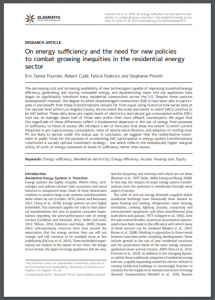Full Title: On energy sufficiency and the need for new policies to combat growing inequities in the residential energy sector
Author(s): Eric Daniel Fournier, Robert Cudd, Felicia Federico, Stephanie Pincetl
Publisher(s): Elementa Science of Anthropocene
Publication Date: June 11, 2020
Full Text: Download Resource
Description (excerpt):
The decreasing cost and increasing availability of new technologies capable of improving household energy efficiency, generating and storing renewable energy, and decarbonizing major end use appliances have begun to significantly transform many residential communities across the U.S. Despite these positive developments however, the degree to which disadvantaged communities (DACs) have been able to participate in and benefit from these transformations remains far from equal. Using historical time series data at the zipcode level within Los Angeles County, we document the scale and extent to which DACs continue to be left behind. These data show per-capita levels of electricity and natural gas consumption within DACs that are, on average, about half of those seen within their more affluent counterparts. We argue that the magnitude of these differences reflect a fundamental departure in the use of energy from purposes of sufficiency to those of excess. We introduce a set of forecasts that show the extent to which current inequities in per-capita energy consumption, rates of vehicle electrification, and adoption of rooftop solar PV are likely to persist under the status quo. In conclusion, we suggest that the redistributive investment of public funds for the purpose of accelerating DAC participation in energy system transformations constitutes a socially optimal investment strategy – one which reflects the dramatically higher marginal utility of units of energy consumed at levels of sufficiency rather than excess.
